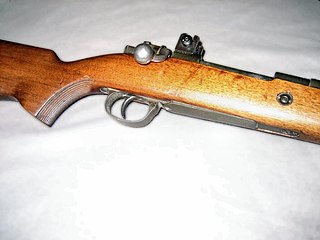Kongsberg M59
| Kongsberg M59 | |
|---|---|
 Kongsberg Våpenfabrikk M59 | |
| Type | Bolt Action Repeating Sniper Rifle Target rifle |
| Place of origin | |
| Service history | |
| In service | 1959 - ca. 2000 |
| Used by | Norway |
| Production history | |
| Designer | Kongsberg Small Arms |
| Designed | 1959 |
| No. built | N/A |
| Variants | M59 and M59F1 |
| Specifications | |
| Cartridge | .30-06 (M59) 7.62 × 51 mm NATO (M59F1) |
| Action | Bolt action |
| Rate of fire | N/A |
| Muzzle velocity | 860-880 m/s |
| Effective firing range | 800 m |
| Feed system | 5 Round |
| Sights | Target aperture sight |
The Mauser M59 and Mauser M67 were produced by Kongsberg Arms of Norway but was not a licensed product of Mauser. Although they were produced by Kongsberg it was always called a "Mauser" in Norway, hence its listing under Mauser.
Mauser rifles in Norway
After WW2, large numbers of German Mauser 98k were apprehended by Norwegian forces. Most of the rifles were rebarreled to .30-06, later to 7.62 NATO, and used as normal service rifles, but a number of Mauser 98 actions were used as the basis for building both military and civilian rifles at Kongsberg Våpenfabrikk.
Kongsberg Våpenfabrikk Skarpskyttergevær M59, "Mauser M59"
Kongsberg Våpenfabrikk introduced the M59 (also denoted KV59) in 1959, first chambered in .30-06, but shortly afterwards production was changed to accommodate the new 7.62 NATO round, and M59 rifles chambered for the 7.62 NATO were denoted M59F1. The M59F1 served first as a sniper rifle for the regular armed forces. After the NM149 was introduced, the M59F1 served with the Norwegian Home Guard ("Heimevernet") until the 1990s. It was also used as a civilian target rifle, having the advantage over the Krag-Jørgensen M1894 that it did not suffer from changing point of impact in rainy weather. Thus, many shooters had a Krag-Jørgensen for the sunny days and one Mauser for rainy days.
Technical details and images
Kongsberg Våpenfabrikk used German Mauser 98k actions for manufacture of the M59. The picture shows a civilian M59.
Closeup of the action beddet into the stock:
Old markings were removed, and the front receiver bridge was opened to accommodate loading of the somewhat longer (compared to the 7.92x57 mm Mauser) .30-06 cardridge,
This is also found on the M59 rifles which were rechambered to the 7.62x51 NATO cartridge. On the civilian version, only the extractor claw was blued, while the rest of the bolt was polished, while on the army issue M59F1, the whole bolt was blued.
The pistol grip:
The magazine follower on the 98k would lock the bolt's forward motion on an empty magazine. This feature was retained on the M59:
The half-length cleaning rod was screwed into the fore-end. Two to three of these were required to assemble a rod of sufficient length:
A civilian M59 (top) in .30-06 and the army issue M59F1 in 7.62x51 NATO (bottom, with a side-mounted scope). Note the blued bolt and absence of the cutout in the front receiver bridge on the M59F1. Note also the different markings on the front receiver bridge.
Alternative model designations
- Kongsberg Våpenfabrikk Modell 1959
- KV59
- KV M59
- Kongsberg-Mauser M59
- Skarpskytterrifle M59
The M59 was redesigned in 1967, hence the M67, and was made by parts of seized German M98 of WW2,fitted with a heavy target stock and a heavy drawned barrel.It was usually fitted with Busk diopter sights. It was chambered in 6.5x55, 7.62 NATO and in .22 LR as a single shot. The M59, M67 and the Krag-Jørgensen were the official target rifles of the Norwegian DFS until the adoption of the Sauer 200 STR in the 90's.
See also
Other Norwegian rifles:
- Kammerlader - the first breech loading rifle in service in Norway.
- Remington M1867 - the first rifle for metallic cartridges adopted by the Norwegian Army
- Krag-Petersson - the first rifle designed by Ole H J Krag that was adopted by an armed force.
- Jarmann M1884 - the rifle the Norwegian Krag-Jørgensen replaced.
- Krag-Jørgensen - the most successful Norwegian firearm to date
- Kongsberg Skarpskyttergevær M67 - The 1967 redesign of the M59
- Våpensmia NM149 - the rifle that replaced the M59F1 as a Norwegian sniper rifle
References and notes
- Hanevik, Karl Egil (1998). Norske Militærgeværer etter 1867. Hanevik Våpen. ISBN 82-993143-1-3







